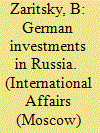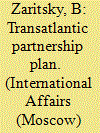| Srl | Item |
| 1 |
ID:
117390


|
|
|
|
|
| Publication |
2012.
|
| Summary/Abstract |
SO FAR THE GERMANS have known about the crisis in the eurozone mainly from newspaper headlines and popular TV programs. In Germany itself, all is still relatively quiet. According to the latest opinion polls, almost 60% of German citizens are convinced that in the coming year their living standards will improve and they will keep their jobs.
True, the German economy is slowing but, according to forecasts, it will continue to grow in the current year as well. Unemployment is at a 20-year low (5.6% of the working-age population in May 2012). Over the past year, wages have slightly increased (+1.1%), as well as labor productivity (+1.6%). The budget deficit has been reduced to an acceptable level: 1% of GDP. Under the medium-term fiscal plan adopted in June 2012, the German government expects to balance the Federal budget by 2016.
|
|
|
|
|
|
|
|
|
|
|
|
|
|
|
|
| 2 |
ID:
138059


|
|
|
|
|
| Summary/Abstract |
GERMANY has traditionally been and remains a net exporter of capital. According to UNCTAD estimates, the cumulative amount of German foreign direct investment abroad (outward FDI stock) at the end of 2013 was more than double the stock of foreign direct investment in Germany: $1.7 trillion and $851 billion, respectively.Increasing competition in global markets compels not only large, but also many medium-sized German companies to modify their foreign economic strategy by supplementing traditional exports of goods with an expansion of production facilities and distribution networks in other countries.
|
|
|
|
|
|
|
|
|
|
|
|
|
|
|
|
| 3 |
ID:
153458


|
|
|
|
|
| Summary/Abstract |
IN THE PAST FEW YEARS, almost all indicators of economic cooperation between Germany and the post-Soviet countries, including Russia, have worsened sharply against the background of Germany's dynamically growing trade with the rest of the world.
|
|
|
|
|
|
|
|
|
|
|
|
|
|
|
|
| 4 |
ID:
123903


|
|
|
|
|
| Publication |
2013.
|
| Summary/Abstract |
THE RADICAL ENERGY POLICY SHIFT declared by the German government still remains a priority theme in public debate in the FRG Despite the impressive growth of the proportion of renewable energy sources (RES) in electricity generation, experts and the business community are having increasing doubts about the wisdom of the course taken by the Government in quickly winding down the nuclear energy industry, pushing out hydrocarbon energy resources and speedily introducing RES. How will the break-up of the existing structure of the energy balance tell on the competitiveness of German industry and on household budgets as electricity prices will inevitably rise in the future? Can the weather-dependent wind and solar power plants reliably provide an uninterrupted supply of electricity to businesses? What financial resources will be needed to upgrade and expand the network infrastructure for integrating new parks of RES stations into the national grid?
|
|
|
|
|
|
|
|
|
|
|
|
|
|
|
|
| 5 |
ID:
143722


|
|
|
|
|
| Summary/Abstract |
THE 23RD OF OCTOBER 2015 was the final day of the 11th round of negotiations between the European Union and the United States on a proposed free trade treaty. The full name of the accord, the Transatlantic Trade and Investment Partnership (TTIP), reflects its comprehensive character. The proposed agreement aims not only to remove customs barriers but also to harmonize various regulatory standards, protect investors, put restrictions on the use of subsidies, provide foreign companies with equal access to government procurement contracts, and solve a whole range of other sensitive problems. TTIP may bring into being a mega-bloc that would account for a nearly 40% share of the gross world product and run one-third of international trade.
|
|
|
|
|
|
|
|
|
|
|
|
|
|
|
|